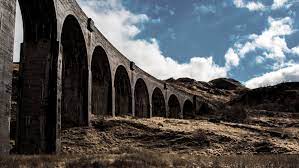Blessed Be Egypt, Assyria and Isra’el
19: 23-25
Blessed be Egypt, Assyria and Isra’el DIG: What does the highway motif indicate about the restored fellowship between Egypt, Assyria, and Isra’el (also see 11:16 and 40:3-4)? How would Isaiah’s fellow Jews feel about the Assyrians? What effect would hearing 19:25 have on them? What does that show about God’s attitude toward other nations?
REFLECTION: Egypt and Assyria represent all the nations (see 2:2-4 and Revelation 7:9-11). What then do these verses imply about God’s relationship to the world? Therefore, how will you pray for the world?
In that day once again points to the far eschatological future in the Millennial Kingdom. In a remarkable statement Isaiah sees the end of the ancient hostility between Assyria and Egypt. No more will Isra’el be merely a pawn between these warring powers. Now she will take her place beside them to fulfill the ancient promise: and all the peoples on earth will be blessed through you (see the commentary on Genesis, to see link click Dt – I Will Bless Those Who Bless You and Whoever Curses You I Will Curse). Nor will God’s blessing be for her alone. It will be impartially given out to all nations.60
Here Isaiah deals with the union of three previous enemies: Isra’el, Egypt and Assyria. Assyria today is Iraq and a small portion of Syria. Iraq covers a huge area, which includes ancient Babylonia and Assyria. Modern Syria extends further out, which includes parts of ancient Assyria. There will be three types of unions: an economic union, a religious union, and a blessing aspect to the union.
The economic union: Isaiah speaks of a highway out of Egypt to Assyria. In that day there will be a highway from Egypt to Assyria. The Assyrians will go to Egypt and the Egyptians to Assyria (19:23a). A highway is a favorite metaphor in Isaiah for the removal of alienation and separation (11:16, 33:8, 35:8, 40:3, 49:11, 62:10). In the rough and hilly country of Isra’el, this could be easily understood. Isaiah’s message was clear. Do not make a highway, or an alliance, with Egypt to escape from Assyria. Isaiah emphasizes that Judah’s only hope, and in reality Egypt’s only hope, is in ADONAI.

What was unquestionably the most important highway in the ancient world is sometimes referred to as the Great Trunk Road; it passed from Egypt to Babylonia and to frontiers beyond and vitally linked each part of the Fertile Crescent in all periods. This highway began at Memphis, near the base of the Nile delta, and passed the Egyptian towns of Ra and Sile before arriving at Gaza. Gaza was an important Egyptian provincial capital, and it sometimes served as a launching pad for Egyptian campaigns through Palestine and Syria. This southern-most sector of the highway was of paramount importance to Egyptian security; it was the way of Horus in Egyptian literature. In the Bible this segment of the road was known as the way to the land of the Philistines’ (Exodus 13:17).61 Since 1948 the Great Trunk Road has been cut off from both the Egyptian border on the south and the Syrian border on the north. But when this union is established, the “way of Horus” will be reopened and once again there will be a highway between these three nations.
The religious union: There will also be a religious union, because they will worship the same God. The Egyptians and Assyrians will worship together (19:23b). People in these two nations, bitter enemies in Isaiah’s day, will worship together.
The blessing aspect to the union: In that day Isra’el will be the third nation, along with Egypt and Assyria, which will be a blessing on the earth. ADONAI-Tzva’ot will bless them, saying: Blessed be Egypt My people, Assyria My handiwork, and Israel My inheritance (19:24-25). The titles My people, My handiwork, and My inheritance always belonged to Isra’el (Second Samuel 3:18; Isaiah 29:22; Psalm 28:9). But during the Messianic Kingdom, they will be shared.
In a remarkable statement, Isaiah applies terms previously restricted to Isra’el to both Egypt and Assyria. He calls Egypt, My people (10:24, 43:6-7; Hosea 1:10, 2:23; Jeremiah 11:4) and Assyria, My handiwork (Isaiah 60:21 and 64:8; Psalms 119:73 and 138:8). It is true that the favorite term, My inheritance, is reserved for Isra’el (Deuteronomy 32:9), but the claim that this term gives a slightly special standing to Isra’el is an argument from silence. In fact, Assyria, Egypt and the rest of the earth will also be the recipients of blessing in that day, the Millennium.
Compare this passage with Ezeki’el 29:13-16. Combining what Isaiah has to say, and what Ezeki’el has to say, we see that at the end of the Tribulation Egypt undergoes a national conversion. Yet, because of their previous history of continuous hatred against Isra’el, during the first forty years of the Millennial Kingdom, the Egyptians will be dispersed among the peoples of the earth. Egypt will be deserted during this time. Then after forty years there will be a regathering of all the Egyptians. But Egypt will never again be a kingdom ruling over other nations.
The underlying point in this section is that if Isra’el trusts in Egypt to protect her instead of God, she will be prostituting her ministry to Egypt. Instead, she is to be the vehicle whereby those very nations can turn to her God and become partners with her in service to Him and enjoy His blessings.62



Leave A Comment